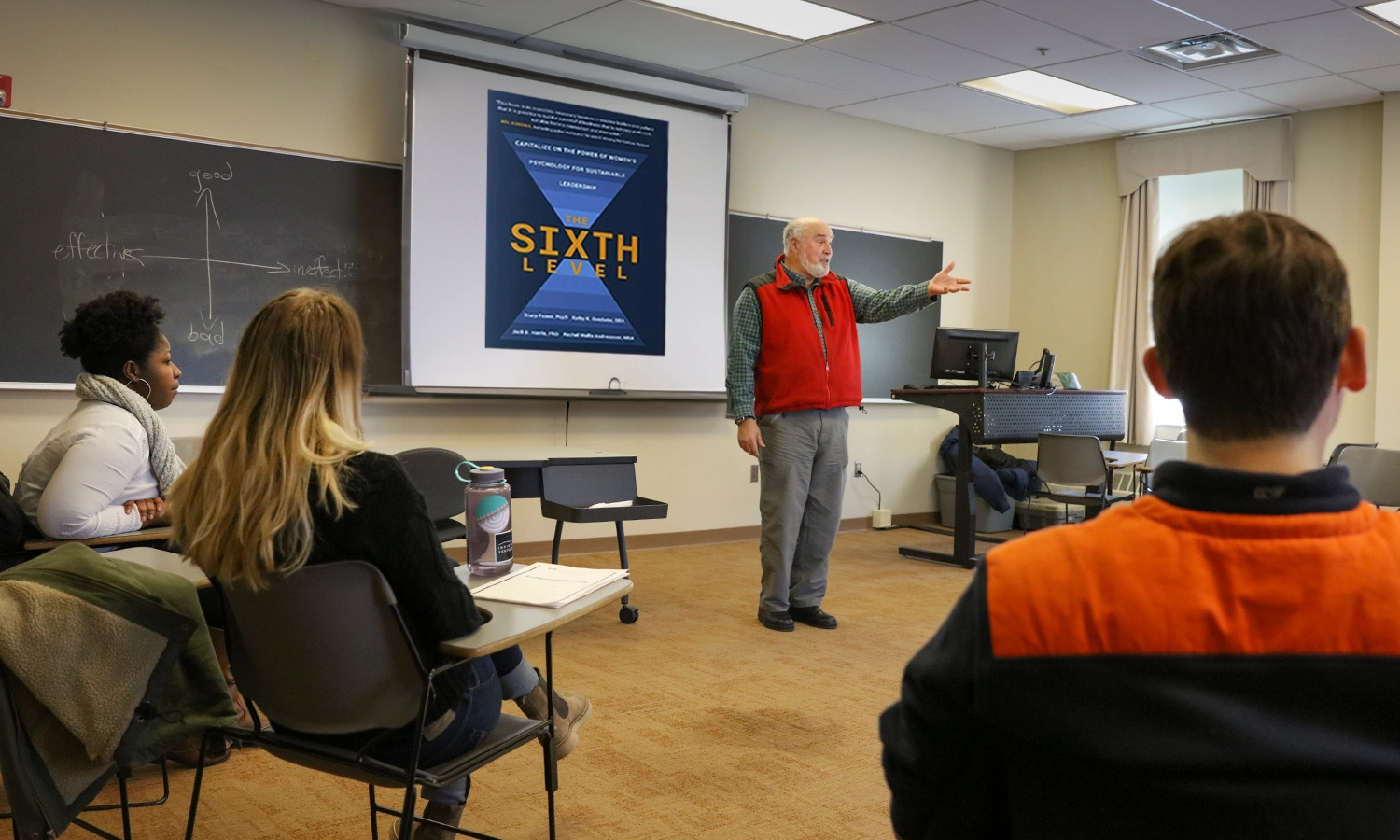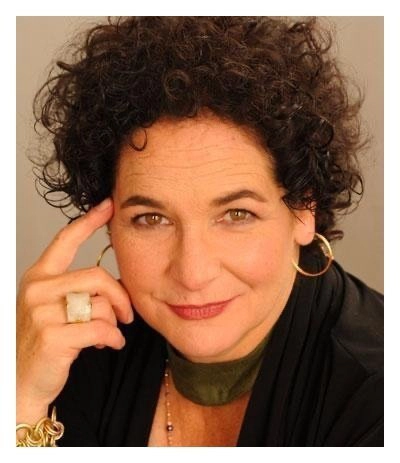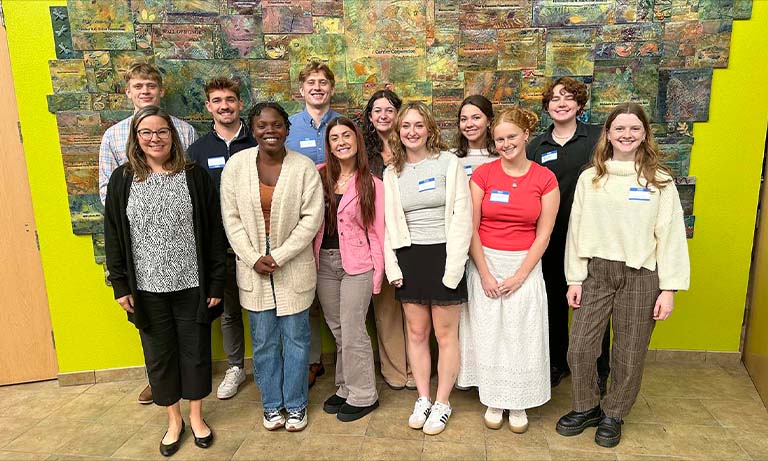
HWS News
5 March 2024 • Alums • Faculty • STEM Reimagining Leadership: Feiner ’86 and Prof. Harris Team Up
A new book by psychologist and entrepreneur Stacy Feiner ’86 and Professor of Sociology Jack Harris offers a model for successful leadership.
With The Sixth Level: Capitalize on the Power of Women's Psychology for Sustainable Leadership, Professor of Sociology Jack Harris P’02, P’06, Stacy Feiner ’86 and their coauthors have developed a roadmap for leadership that harnesses interpersonal connection and intrinsic motivation.
The book, written with Kathy K. Overbeke and Rachel Wallis Andreasson, shares the stories of CEOs, owners, executives and entrepreneurs, demonstrating the strategies and principles that women leaders use when they turn challenges into opportunities to create sustainability and prosperity.
Feiner and Harris describe the book as theoretical and practical. On the theoretical side readers learn the impact of leadership models that are defined and dominated by the system of patriarchy and how the invisible rules of these models define, direct, and cloud the way we live and lead. The authors show how self-actualization, the fifth level of Maslow’s hierarchy of needs, is incomplete.

A psychologist and high-performance coach, Feiner supports leaders as they solve emotionally charged situations and helps them succeed professionally and interpersonally. Sixth Level leadership derives from the specific psychological characteristics that she observed in the women she coached, qualities that rely on “human connection” in contrast to leadership “based on forms of domination and control.”
The book introduces a new higher level of human function, one found in Self-in-Relation, which is based on human connection. In practice, what makes women leaders so effective is that they harness and can toggle between the analytic and the empathetic, leading with an ethic of care. The stories of seasoned women leaders show they achieve significant results utilizing four Core Differentiators: Mutuality, Ingenuity, Justness, and Intrinsic Motivation, which set the foundation of The Sixth Level. Both men and women can learn to be Sixth Level Leaders.
“The book is a journey that leads the reader to understand for themselves why the model of leadership is so necessary,” Feiner and Harris agree. “The time is right. There is energy for change fueled by intense global systemic disruptors: the health pandemic, ethnic and racial unrest, global economic distress, and an environmental crisis. Our lives are emotionally, socially, and relationally strained, which skews the ways in which we engage the world and ourselves. Leaders are ready to seize a new level of leadership. The Sixth Level points the way.”
During the early stages of drafting the book, Feiner and Andreasson consulted with Harris, whose sociological research spans gender and leadership. Soon it became clear that his insights — especially around the ways patriarchy has shaped models of leadership — were essential to the project.
Harris underscores the “exceptionally collaborative” nature of the writing process — and Sixth Level leadership itself.
“That’s part of the point of Sixth Level leadership — to be in this highly collaborative, highly thoughtful and highly mutual environment,” he explains. “It was especially heartening and wonderful to work with Stacy. I'm honored that she recognized what I can contribute and invited me.”
Harris’ 50-year teaching career at HWS concludes at the end of the spring semester. He says the book “is the expression and the culmination of a lot of the work that I've done in the classroom on men’s studies, on gender relations and on leadership. In that regard, it’s a nice way to retire.”
Harris provides readers with a deeply profound experience reminiscent of the awakening he facilitates among his students. This awakening enables students and readers alike to view themselves as active participants in the social world and to recognize the interconnectedness between their personal experiences and broader societal structures.
For Feiner, the opportunity to collaborate with Harris is thrilling, an affirming full-circle moment. “Jack has been a critical influence in my life,” she says. “Jack reaches people at the very core of how they organize the ideas that ultimately shape their view on the world.”
She notes that Harris’ contribution mirrors “his sociology of community class, his sociology of gender class, his sociology 101 class, his men’s studies class. It’s the crib notes, the treasure chest, of all the ways he has taught his students. And I believe the world needs that lesson. It’s fundamental. He helps us see the invisible water we swim in.”
The Sixth Level is now available through thesixthlevel.com, and from leading booksellers. Learn more here.
Feiner holds a B.A. in sociology from HWS and earned her Psy.D. in clinical psychology from the Illinois School for Professional Psychology. In 2015, she published her first book, Talent Mindset: Building Bench Strength. With Overbeke, she writes From Theory to Practice, a blog on Psychology Today, and she also writes for the popular press, including Forbes Magazine and Crain's Business Journal.
Feiner previously coached financial advisors at Merrill Lynch and served as an HR executive at Key Bank before founding Feiner Enterprises, which offers a new lens to improve the performance of privately owned companies, their teams, families and boards. She serves on the board of several middle-market companies, a tech start up and Goodwill of Cleveland.
For decades, Harris has taught, researched, and published about men and masculinity, especially as it is expressed in Vietnam. He has also studied the impacts of stress, inertia and change within large corporations and organizations. As an applied sociologist, he consults with local governments across the United States on business process reengineering, change management and municipal information technology.
A member of the HWS faculty since 1974, Harris teaches a range of entrepreneurial and internationally oriented courses in sociology. Among his many academic experiences abroad, he has directed six HWS semester-long abroad programs, twice in London, England, twice in Hanoi, Vietnam, and in Rome, Italy, and Galway, Ireland. He has directed four short term HWS programs, in Berlin, Germany and Havana, Cuba on socialism and capitalism, and on social entrepreneurship in Panama and Ghana. A 2017-18 Kinghorn Fellow at HWS, he holds a B.A. from Tulane University and M.A. and Ph.D. from the University of Pennsylvania.



